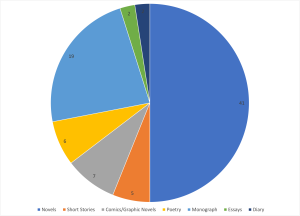In 2015 I read 77 books. That’s a fairly big increase from the previous year, when I read 57, and it happened without my making any conscious effort to read more. It also happened, I should acknowledge, without my apparently wasting any less time doing stupid things on my phone and whatnot. I did actually get some research reading done this year, for the first time in a while. Mostly, though, I think it’s just that when I had free time last year, I tended to spend it reading more often than anything else.
Those 77 books included 32 novels— well less than half, which is a pretty low percentage for me. Even more surprisingly, I read only a single collection of short stories. I read six books of poetry, a number I’d like to be higher next year. Seven books were graphic novels or comics in trade paperback; six I listed as either children’s or young adult. And, finally, I read 28 non-fiction books in 2015, of which I classified four as biography or memoir, and one as a collection of essays. Eight of my 77 books were published in 2015.
Three books stand out as my clear favorites from the past year. The first is Claudia Rankine’s Citizen: An American Lyric, and if I had to choose a single favorite book from 2015 it would be that one; I read it back in January, and haven’t stopped thinking about it since. It’s categorized— rightly— as poetry, but one could also think of it as a collection of micro-essays, freed from the constraints of the essay form by being called poetry. With incredible economy and clarity, Rankine evokes experiences that are common for people of color but often unnoticed or unremarked by white people; the reader is almost always addressed directly, as “you,” and all she’s really doing is asking you to consider what is going on in certain kinds of common interactions between people of different races— the kinds of interactions we’ve begun to describe, in an inappropriately sterile coinage, as “microaggressions.” The most prominent book about race in 2015 was, obviously, Ta-Nehisi Coates’s Between the World and Me, and while I’d definitely recommend that people read that one as well, I think it ultimately has problems that distract from what he has to say about race and racism in America generally. Rankine, on the other hand, avoids some of those pitfalls precisely by writing poetry instead of essays or memoir; she can suggest, limn, outline an idea and leave it to the reader to come the rest of the way. She simply asks, in effect, “What if this happened to you?”, and the wonder of the book is how elegantly and completely the “this” is evoked. Coates’s book, on the other hand, is so deeply embedded in his own experience, his own perspective, that it leaves no room for anything else; you feel you have either to take it, whole, or leave it. Rankine leaves you room to breathe while, simultaneously, never letting you off the hook.
I also loved, and have been evangelizing for, Ben Lerner’s second novel 10:04. It’s a bit of a struggle to describe what exactly this book is “about”; Ben Lerner is a poet who found surprising success with his first novel. 10:04 is about a man named Ben Lerner who is a poet who found surprising success with his first novel, and is struggling with writing a second; the story, such as it is, is the story of those efforts gradually, perhaps inadvertently, producing the book in your hands. That sounds like it’s all kinds of meta and, really, I guess it is, but it’s never heavy-handed and it never feels like he’s playing games for their own sake; there’s no winking at the reader, and no need to try to figure out which parts “really” happened and which didn’t. At the same time, that intertwining of his own life with that of his characters does, I think, actually do some work; more than anything else, it’s a novel about art, and while there are plenty of moments in which the narrator is explicitly looking at and thinking about specific works of art (Christian Marclay’s The Clock gets a lot of attention, as do Donald Judd’s sculptures in Marfa), the interplay between the novel and the outside world also makes you think about the book in your hand as a work of art, laden with authorial intentions that may or may not come through. There’s nothing new about a book that calls your attention to the fact that it is a book, a piece of fiction, but what’s remarkable about this one is that Lerner doesn’t apparently do it to throw the reader out of the story or reduce her involvement in plot and character. 10:04 somehow manages to work as a novel in all of the expected ways while still making you think about the fact that it is a novel designed to provoke those reactions. It makes the case that intellectual complexity doesn’t need to undermine emotional engagement.
The third highlight from my year of reading was an older book, Marilynne Robinson’s Gilead, and it’s probably the hardest for me to write about. I am not a religious person, but I do believe that human beings have moral obligations toward one another, and recognize that religion can, in the right hands, be a way of clarifying and reminding us of those obligations. That, to me, is basically what this book is about. It’s written as a kind of extended letter from John Ames, an older father and Congregationalist minister in small-town Iowa who has been told he is likely dying, to his young son; the idea being to tell his son some things he considers important and which he might not ever get to otherwise. As he goes on, though, it becomes a kind of hybrid family history/diary, with stories of his father and his militant abolitionist grandfather intermixed with his present-day impressions of people and events. The thing that makes this all so compelling is the voice of Ames: thoughtful, reflective, compassionate, humble but deeply intelligent, and dedicated to directing that intelligence toward the living of an ethical life. At one point, Ames tells his son, “This is an interesting planet. It deserves all the attention you can give it,” and this, to me, is the core of the book: the world, and the people in it, deserve, your attention, are entitled to it, and will reward that attention if you give it.. Later, he says “…in my present situation, now that I am about to leave this world, I realize there is nothing more astonishing than a human face…Any human face is a claim on you, because you can’t help but understand the singularity of it, the courage and loneliness of it.” I’ve rarely read anything that more aptly captures the idea that being in the world is both a burden and a gift, and that it couldn’t be one without being the other.
I read a number of other good books this year, but these are the three that have continued to come to mind in the months since I read them, and so have most characterized the year in reading for me. If 2016 includes three books this good, I’ll call it a successful year.


